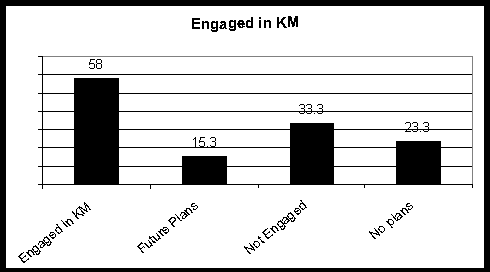
ABSTRACT:
Much of the writing on knowledge management is related to the private sector. This first study of the state of knowledge management in local government in Australia breaks new ground. Its research hypotheses are based upon familiar knowledge management problems and proposed solutions, tested by questionnaire survey and follow up interviews. In addition to answering questions about policies and perceptions, local authorities rated themselves on such activities as knowledge management, knowledge sharing and ability to learn from experience. Local government in Australia is showing interest in knowledge management, as evidenced by the development of infrastructures and by concerns with the loss of knowledge and the deployment of mechanisms for the sharing and reuse of knowledge. This interest is also evidenced by an emphasis upon learning and a growing appreciation of the value of human resources, as the creators of knowledge and the source of solutions. More research into this area is needed, particularly research into a range of metrics for knowledge management.
Introduction
Knowledge management is a key concern for organisations. The problems associated with poor knowledge management manifest themselves in a loss of organisational knowledge, the expensive duplication of knowledge-creation and acquisition activities, rising costs and reduced competitiveness. In those commercial organisations where knowledge and its management have emerged as a core competence, a knowledge-based value proposition for business can be identified. This seems to be much less common in the public sector and there is a particular dearth of reported knowledge management activity within local government. This paper is based on the first such study of knowledge management in local government in Australia.
Knowledge Management and Local Government
Local government in Australia is the responsibility of individual state governments. Following recent restructuring there are now around 700 local authorities in Australia, most of them with small populations and some covering vast areas. With the advent of new models of local government based on shared responsibility between a council and a professional city manager, the Mayor is no longer the Chief Executive Officer (CEO). Clearly in what is a much more business-like and indeed, entrepreneurial environment, those responsible for the administration and management of local government need access to the best information and knowledge available.
Although a range of increasingly sophisticated technologies is available to assist in the process of knowledge-based change, it is important to resist the temptations of silver bullet digital solutions. Whereas technology can provide an electronic framework for capturing, codifying and distributing key information and knowledge throughout the organisation, this is likely to address only part of the problem. What is required is a response that promises to build the kind of capabilities likely to integrate, exploit and dynamically re-configure knowledge in order to deliver customer value. This will entail attention to those wider cultural issues identified as critical to knowledge-based change in the private sector, issues of staff collaboration, knowledge-sharing and organisational learning.
Core Concepts
The core concepts of knowledge and knowledge management have been defined as follows:
The links to customer value and performance both emphasise the business relevance of knowledge management and serve as a useful antidote to the general motherhood statements frequently associated with knowledge management.
The Project
The project examined the state-of-play at the corporate level, with a series of questions addressed directly to Chief Executive Officers and at the operational level, where the bulk of the questions were aimed at various levels of knowledge management within the organisation. Such an approach it was thought would offer a number of benefits. First it would indicate the extent to which the concept and practice of knowledge management was part of the mission and strategic planning of local authorities. Second, it could help identify any developing trends whereby local government units were becoming knowledge-based organisations. The questions ranged across such themes as organisational structures and management systems, technologies, knowledge management practices and problems, the kinds of knowledge involved, any metrics employed and links to staff training and development.
Fundamental Problems
Underlying the basic research design was an expectation that as in the private sector, local government would encounter a number of fundamental problems in its attempt to come to grips with knowledge management. These included:
These problems are symptomatic of poor knowledge management and their identification has been a major driver behind its development. They are of signal importance not just to the operation but also to the outcomes of this research project.
Research Objectives
The specific research objectives were to identify perceptions and trends in the implementation of knowledge management in Australian local government in the context of new corporate structures. It was expected that the increasingly corporate nature of the local government as evidenced by such practices as Compulsory Competitive Tendering and outsourcing, benchmarking, performance management and service quality programs would be likely to impact on the uptake of knowledge management. With local government in effect, having to operate as a business, a number of research hypotheses emerged.
Research Hypotheses
Research Methodology
Following an extensive literature review and the conduct of focus groups to clarify concepts and terminology, the main research tools employed were a postal survey and follow-up interviews. A questionnaire was pre-tested on a 10 per cent sample of local authorities in the state of Victoria. The final research population was those 670 councils that were listed on the membership database of the Australian Local Government Association. A response rate of just over 21 per cent was obtained. These data were then analysed using the SPSS 9 software package. At the conclusion of the questionnaire a series of interviews involving visits to local authorities in every state and territory in Australia was launched. Still in progress, these visits are pointing the way to a third phase of the project aiming at metrics for knowledge management.
General Findings, Part 1
A number of themes identified in Part #1 of the survey are reported on here. These include:
A majority of respondent authorities (58.0 per cent) were engaged in knowledge management activities, with a further 15.3 per cent stating that they had plans to become involved in the near future. However 33.3 percent were not engaged in knowledge management activities and a further 23.3 percent said they had no plans to engage in knowledge management in the future.

The data also shed light on the level of such activities. It was interesting that of the 58 per cent of councils engaged in knowledge management, less only 6 per cent had a working definition of knowledge management. This could be perceived as a weakness, indicating a casual approach to the subject. On the other hand, knowledge management is by no means an exact science and it makes little sense to prescribe activities tightly from a theoretical standpoint for people who, often in widely-differing environments, are striving to come to terms with the practicalities of knowledge management.
Much more of a concern was the fact that of 87 local authorities engaged in knowledge management, only 16 per cent had a knowledge management strategy. Furthermore, only 24.0 per cent of authorities had a senior person in charge of the knowledge management function. Of those authorities with such a position only 16.7 percent had a specific title for the job.
There were two main explanations for the absence of a senior knowledge management position. Either it was treated as an additional responsibility for an existing post (21.0 per cent), or everybody was regarded as having a responsibility for knowledge management. (51.per cent) Almost 20 per cent of local authorities pleaded the existence of other priorities, common amongst which were: unemployment, problems at the level of information management, the need to keep within tight budgets, benchmarking and best practice and pending reorganisations.
General Findings, Part 2
Among those themes in the second part of the survey that are featured here are:
Some 50.7 per cent of local authorities rated their own awareness of knowledge management as very poor and 52.0 per cent said the same about the quality of knowledge management in their organisation. For knowledge sharing, 28.0 per cent rated this as being poor; while37.3 per cent described it as being good. Almost 60 per cent of respondent organisations rated their ability to learn as good, with only 13.3 per cent. regarding this as poor.
Table 1. Organisational self
assessment on key KM characteristics |
|||
| Self assessment | Poor | Average | Good |
| Awareness of value | 50.7 | 11.3 | 26.0 |
| Quality of KM | 52.0 | 15.3 | 19.3 |
| Level of sharing | 28.0 | 21.3 | 37.3 |
| Ability to learn | 13.3 | 18.7 | 56.7 |
Other questions sought to identify the existence of fundamental knowledge management problems, as outlined above and potential sources of solutions. It is interesting that clear majorities all described as untrue the suggestion that they were having problems in accessing knowledge (47.3%), with knowledge hoarding (40.0%) and with poor decisions (48.0%) However, almost 65 per cent of local authorities admitted to experiencing knowledge loss and only 10.7 per cent denied that this was an issue.
Table 2. Organisational self
assessment on key KM problems |
|||
| Self assessment | True | Average | Untrue |
| Unable to access knowledge | 10.0 | 51.3 | 27.3 |
| Knowledge is lost | 44.7 | 40.0 | 4.0 |
| People hoard knowledge | 16.0 | 53.3 | 19.3 |
| Knowledge is job security | 15.3 | 54.7 | 18.7 |
| Useful knowledge is ignored | 13.3 | 48.7 | 26.7 |
| Old rules applied to new situations | 12.0 | 58.0 | 18.0 |
Among the potential sources of solutions to knowledge problems less than 17.0 per cent of local authorities had a strategy for knowledge management and just under 25.0 per cent had mentoring programs for staff. However, 66.0 per cent claimed to have a learning focus and as regards various mechanisms for knowledge sharing, 58.0 per cent had general mechanisms for this purpose, 62.7 per cent had inter-departmental mechanisms, 55.3 per cent had mechanisms for exchanging knowledge with clients and 47.3 per cent had mechanisms for the reuse of knowledge. These data can then be compared against the research hypotheses.
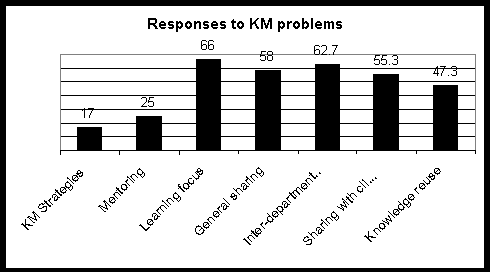
Initial Hypothesis Testing
At this stage in the project it is too early to be categorical as to the validity of the hypotheses but a number of general observations can be made re: the Hypotheses listed above:
1. The move to corporate planning and accountability within local government would require the adoption of formal knowledge management processes
Observtions on Hypotheses #1: It is clear from responses to the questionnaire and from that minority of follow-up interviews conducted to date, that local authorities across Australia are beginning to address the problems of knowledge, of learning and of innovation and to varying degrees are adopting processes to deal with these. There is thus a strong prima facie case for supporting the first hypothesis.
2. In a corporate environment organisations would experience knowledge loss and reinvention of the wheel (duplication)
Observtions on Hypotheses #2: Given that almost 65.0 per cent of local authorities said that knowledge was being lost when people left their organisations, this hypothesis would appear to be reliable. Concern for this has been expressed in follow-up interviews, with a major driver of knowledge management being the desire to stem losses of knowledge.
3. With corporatisation organisations would be involved in reinventing the wheel that is in creating and recreating the same information and knowledge in different parts of the organisation
Observtions on Hypotheses #3: As nearly 50.0 per cent of respondents believed that reinvention of the wheel was not occurring in their organisations and only 24.0 per cent thought that it was, the survey data do not support this hypothesis.
4. Where knowledge management occurred it would be directed to the capture and dissemination of explicit knowledge rather than tacit knowledge
Observtions on Hypothesis #4: Some indication of the validity of this hypothesis can be gained by looking at the kinds of technologies that are being used in order to share information across local authorities. Predominantly these would be technologies best suited to the control and exploitation of explicit information and knowledge. Apart from electronic mail, which was easily the most popular technology, the most common technologies Groupware (used by almost 40 per cent of respondent councils), Workflow (used by almost 50 per cent) and Electronic Document Management Systems (used 50.0 per cent ) See Appendix 1 for full details. ---This said, the follow up interviews have revealed a growing interest in the acquisition and capture of tacit knowledge. Although at best pointers to such trends, the development of staff mentoring programs (in almost 25.0 per cent of responding councils) and knowledge management awareness programs (in just over 21.0 per cent of responding councils) represent a beginning. Furthermore, that learning focus claimed by 66.0 per cent of respondent authorities will in all likelihood extend to the domain of tacit knowledge. At this stage, therefore, it is best to describe Hence, Hypothesis Four can not be tested in any but a cursory fashion.
5. In a more commercial and competitive local government environment, individuals would be reluctant to share their knowledge with colleagues and in fact would engage in knowledge hoarding.
Observtions on Hypothesis #5: The data in this case did not support the hypothesis. Although the difference between that 30.0 per cent of local authorities who perceived hoarding to be a problem and that 40.0 per cent that did not was relatively small, there were other factors which tended to cast doubt on the hypothesis. In particular the existence of a range of mechanisms for knowledge sharing would suggest that for these to be there at all there could not be any widespread tendency to hoarding knowledge among local government staff.
6. Those organisations that best understand the value and wider implications of knowledge management would have cultures to facilitate knowledge creation, dissemination and sharing.
Observtions on Hypothesis #6: Connections between the data and this particular hypothesis are perhaps the most tenuous of all. The researchers sought for signs of cultural fit with knowledge management by looking for evidence of knowledge-intensive process and behaviours within the data. The fact that in excess of 50. per cent of respondent authorities said they could identify such key processes as access to knowledge, representation of knowledge and sharing of knowledge lends some support to the hypothesis. To this was added the fact that almost 60.0 or respondent organisations _had training profiles aimed at awareness building rather than at job-specific training. These data to some extent suggest that the need for appropriate cultures is beginning to be appreciated. This impression has been strongly reinforced in the follow-up interviews, with every organisation interviewed so far being convinced of the need to nourish a culture of knowledge sharing and openness. It seems safe to say, therefore, that while not proven, the conditions for validation of Hypothesis Six are beginning to emerge.
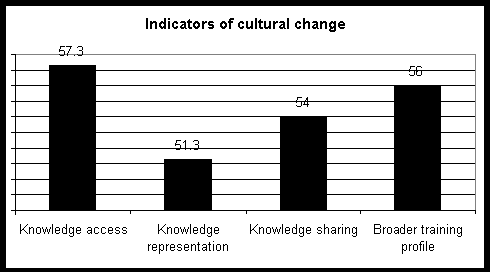
Implications of Crosstabs Data
Use of the crosstabs function in SPSS enabled deeper analysis to be made of key themes including: links between knowledge management and knowledge strategy, knowledge loss, reinvention of the wheel, knowledge hoarding, knowledge leveraging, mechanisms for knowledge sharing, training programs to foster awareness of knowledge management, and ability to learn.
Knowledge Management and Knowledge Management Strategy
An underlying assumption in the questionnaire was that of a positive link between those organisations who were engaged in knowledge management and those who had a strategy for knowledge management. However, the cross-tabulated data revealed that of 83 organisations claiming to be engaged in knowledge management only 15 organisations had a knowledge management strategy, while 111 did not. The question then arises as to whether or not it is possible to be practising knowledge management in the absence of a strategy for the purpose. Whereas the answer as reflected in these data must be that it is, this raises additional questions as to the nature and level of knowledge management and indeed, perceptions of what it involves. Similar questions arise in relation to links between the practice of knowledge management and other variables.
Knowledge Loss
The loss of knowledge either through staff defections or retirement or simply as the result of poor resource management is a critical driver of the move to knowledge management. One of the first things to emerge from the data was that of the 86 organisations that claimed to be engaged in knowledge management, almost 20.0 per cent admitted to knowledge loss. Of the 44 who were not engaged in knowledge management, nearly 30.0 per cent were experiencing knowledge loss. It seems also that knowledge loss was a problem whether or not local authorities had a strategy for knowledge management. Of the 16 organisations operating a knowledge management strategy, almost 60 .0 per cent acknowledge the loss of knowledge, while for those organisations without such a strategy the figure was nearly 76.0 per cent. Whereas 71 organisations denied having a problem of reinvention, almost 70.0 per cent of these authorities acknowledged the existence of knowledge loss.
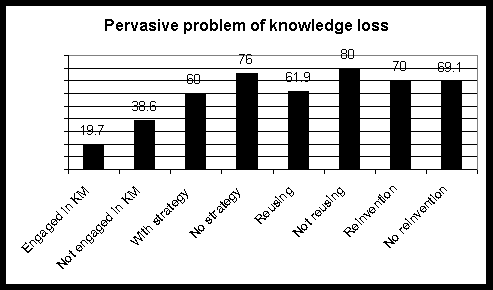
In those 45 organisations that had problems stemming from the fact that some staff tended to regard the possession of knowledge as a form of job security, 40 (88.8%) also admitted to suffering the loss of knowledge. Indeed, of the 57 organisations who had not encountered the link between the possession of knowledge and perceived job security, 39 or almost 70 per cent, agreed that they were experiencing knowledge loss. Also of 55 organisations that did not have in place mechanisms to facilitate the re-use of knowledge, 44 (80%) were experiencing loss of knowledge. The figure for those 71 organisations that did have reuse mechanisms in place was 44 or 61.9 per cent. It is evident, therefore that the loss of knowledge continues to be a serious problem for local government in Australia. This issue appears again under the next theme.
Reinvention of the Wheel
Whereas 71 organisations denied having a problem with 'reinvention of the wheel', some 35 were experiencing difficulties in this regard. In a subsequent cross-tabulation of 55 organisations not experiencing a problem of reinvention, 46 (87.2%) reported that in their organisations everybody was regarded as being responsible for knowledge management. The question then arises as to a possible link between the two. That is, if just about everybody is responsible for knowledge management would this not actually increase the possibility of people creating and recreating the same knowledge in different parts of the organisation? There is also the possibility that reinvention is occurring unknown to management. Reinvention therefore, remains a major concern for those organisations seeking to improve the management of knowledge.
Knowledge Hoarding
Often linked to perceptions of knowledge as job security, the practice of knowledge hoarding continues to challenge the best efforts of managers. The data revealed clear links between the two, with 29 of the 45 organisations that recognised job security as a knowledge issue also identifying the existence of hoarding (64.4 %) Further, in relation to the perceived ability to learn, of 20 organisations rating their own learning ability as poor, 50% recognised the existence of knowledge hoarding as a serious problem. Of the 85 who rated their learning ability as good, just over 25.0 per cent reported the existence of hoarding. There may well be an inverse relationship between the ability of an organisation to learn and the propensity of its staff to hoard knowledge.
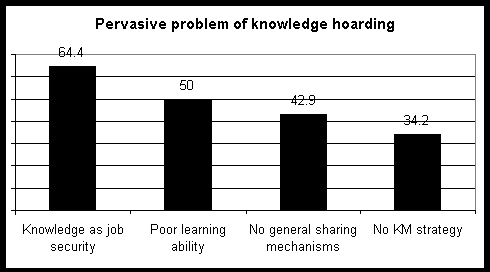
Likewise, of the 42 organisations that did not employ mechanisms for making knowledge widely available, nearly 43.0 per cent had a problem with knowledge hoarding. However, of the 87 who had such mechanisms, almost 30.0 per cent identified the existence of hoarding. The question then arises as to the existence of a positive connection between mechanisms for knowledge availability and a reduction in knowledge hoarding behaviour. Lastly on this point, while 25.0 per cent those organisations operating a knowledge management strategy had a problem with hoarding, of the 111 that were not almost 35.0 per cent were experiencing a hoarding problem. Although this would seem to say something about the value of having a strategy, it also suggests that the general survey findings on the absence of hoarding need to be looked at again.
Knowledge Leveraging
Knowledge leveraging stands right at the opposite end of the spectrum from knowledge hoarding. Just over 30.0 percent of the 85 organisations engaged in knowledge management were able to identify the existence of leveraging, while almost 20 per cent of those not engaged in knowledge management could identify its existence. Perhaps significantly 33 of the 36 local authorities that could identify leveraging in their own organisation also claimed to have a learning focus. Clearly with less than 25.0 per cent of respondent organisations able to identify the existence of leveraging there is much room for improvement. However, the links to key activities such as learning and mechanisms for knowledge exchange reinforce the proposition that an ability to leverage knowledge is critical both to the conduct of knowledge management and to those business outcomes at which it is directed.
Mechanisms for Knowledge Exchange
A major means by which knowledge can be leveraged within organisations is through the use of mechanisms for knowledge exchange. At several points in the research data clear connections can be established between these mechanisms and key activities such as knowledge sharing, the conduct of knowledge management, the re-use of knowledge and learning. For example, almost 76.0 per cent of the organisations that had mechanisms for making knowledge more generally available could identify the process of knowledge sharing within their own organisation. The figures for organisations with mechanisms for sharing knowledge between departments, for sharing with clients and for the reuse of knowledge were respectively: 74.1 per cent, 36.1 per cent and 76.1 per cent A similar picture emerges with cross-tabulations of the four knowledge-sharing mechanisms with perceptions of the level of knowledge-sharing in their organisations. Of those authorities having general sharing mechanisms, 55.0 rated knowledge-sharing as good. The figures for authorities with inter-departmental, client systems and reuse systems were respectively 45.0 per cent, 48.0 per cent and 54.0 per cent. In those organisations without such mechanisms, good ratings for knowledge-sharing ranged across a scale from 20 to 40 per cent. There would appear to be a positive relationship between the presence of knowledge sharing mechanisms and the quality of knowledge sharing within organisations. What then of any links with assigned responsibility for knowledge management?
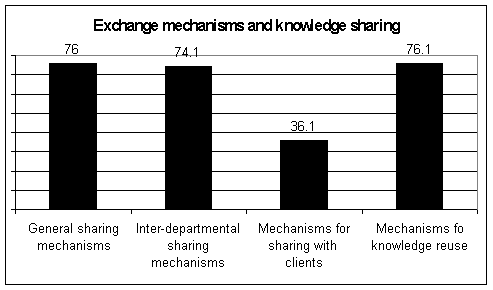
Sharing Mechanisms and Responsibility
The data revealed clear linkages between the existence of sharing mechanisms and accountability for knowledge management. Of those authorities with general sharing mechanisms almost 85.0 per cent stated that in their organisation everybody was regarded as being responsible for knowledge management. The figures for authorities with inter-departmental, client systems and reuse systems were respectively 84.0 per cent, 88.0 per cent and 86.0 per cent. In those organisations without such mechanisms, there was strong support for the idea that everybody was responsible for knowledge management. The responses across the four mechanisms ranged from 69 per cent for general mechanisms to 72.0 per cent for reuse mechanisms. The implication is that the responsibility for knowledge management within local government in Australia is widely diffused. Moreover, this spread of responsibility seems to be independent of the existence of mechanisms for knowledge sharing. So how does the existence of sharing mechanisms relate to the practice of knowledge management?
Sharing Mechanisms and the Practice of Knowledge Management
Once again the data revealed clear linkages between those organisations that were employing various mechanisms for knowledge-sharing and those claiming to be engaged in knowledge management. Of 86 organisations with mechanisms for making knowledge commonly available, just over 72 per cent said they were engaged in knowledge management. The figures for authorities with inter-departmental, client systems and reuse systems revealed that respectively 62.0per cent, 74.0 per cent and 70.0 per cent of those authorities were engaged in knowledge management. In those organisations without such mechanisms, responses ranged from 50.0 per cent in the case of both general and inter-departmental mechanisms through 53.0 for client mechanisms to 62.0 per cent for reuse mechanisms. This prompts the question as to what extent it is possible to engage in knowledge management without having mechanisms for sharing and reusing knowledge.
Another important mechanism for knowledge exchange is the practice of mentoring. The cross-tabulation of Question 1 (doing or not doing knowledge management) with Question 15 (h) (mentoring programs) reinforced perceptions of the significance of this activity. Whereas of the 78 organisations, which stated that they were engaged in knowledge management, 33.0 per cent had mentoring programs, of the 42 where were not so engaged, almost 22.0 per cent had mentoring programs. Mentoring would appear to be important in its own right and its potential for the exchange of both explicit and tacit knowledge would be hard to over-estimate.
Training Programs to Foster Awareness of Knowledge Management
The data for questions to do with training programs for knowledge management were far from encouraging. Nearly 57.0 per cent of respondents to Question 18 (f) reported that their training programs were not designed to foster awareness of knowledge management. It was also interesting to find that of the 32 organisations who reported that their training programs were indeed designed to foster such awareness, just under 35.0 per cent were able to rate the quality of knowledge management in their own organisation as good. Perhaps this has something to do with the timing of the training and its introduction into a hitherto unfavourable environment for knowledge management?
Moreover, almost 75.0 per cent of these same 32 organisations rated their own ability to learn as good. However, of the 85 organisations that did not have such awareness programs, nearly 29.0 per cent still rated their ability to learn as good, a figure which given the apparent connections between awareness and learning seems somewhat implausible. This may be partly explained by the fact that nearly one-third of those organisations without knowledge management awareness programs had mechanisms for making knowledge more widely available, while almost 25.0 per cent employed mechanisms to foster the re-use of knowledge. On a more positive note almost 55.0 per cent of organisations claimed that their training profile was change-oriented. Presumably at some point in this pursuit of change, some attention to the topic of knowledge management would be a possibility?
Ability to Learn
The ability to learn is of critical importance for knowledge management, and applies both to organisations and to the people within them. Hence it was not unexpected that of 84 organisations that rated their ability to learn as good, 75.0 per cent said that they were engaged in knowledge management. It was less encouraging to discover that less than 30.0 per cent of these organisations were able to rate their knowledge management activities as good. Furthermore, the fact that of those organisations that rated the ability to learn as good, 77 per cent could clearly identify a problem of knowledge loss could well be seen to be placing a question mark over their real ability to learn. Not surprisingly in view of what has already been said, learning seems to be a highly prized characteristic within local government in Australia.
Problems and Solutions
While far from validating the research hypotheses, the data serve to reinforce a number of assumptions that underpinned the research project. The existence of the problems almost certainly points to a need for knowledge management processes and practices; the emergence of solutions would appear to be linked to such processes and practice. This latter link remains apparent for this project until additional statistical tests can be applied to the data, and in all likelihood until additional data can be collected. For the present, the problems and potential solutions can be characterised as follows:
Knowledge Management Problem Index is comprised of:
Conclusions
At this stage any conclusions drawn from this research must remain to some extent provisional. The data paint a picture of what is, or is not happening with knowledge management in local government in Australia. It is apparent that as in the private sector, knowledge management has entered the argot of local government. Whether this results in a longer-term commitment or lip-service remains to be seen. As in many countries, local government in Australia is facing severe difficulties of reduced resources and increased accountability on the one hand, and enhanced expectations from the public for a growing and increasingly complex range of services on the other. Those follow up interviews that have been conducted to date have confirmed the turbulent and uncertain nature of the local government environment. Faced with immediate problems of resource allocation and the maintenance of current service levels, it is understandable that a third of local councils surveyed for this project were found not to be engaged in knowledge management.
A major reorganisation of local government in Australia was conducted in 1992 and a number of local authorities are facing the possibility of further restructuring. These changes almost always result in downsizing and in losses not just of staff but of the knowledge they possess. Consequently they have serious implications for staff morale and for a range of behaviours not least those related to the creation, acquisition and sharing of knowledge. Somewhat surprisingly the data did not reveal much of this as regards topics such as knowledge hoarding or the need to reinvent knowledge and their consequences in poor decision making or in outdated responses to new problems. Further research may well produce a different set of results.
On a more positive note both the survey data and feedback gained during follow up interviews support a picture of local government as a sector well aware of wider social and economic change and its implications for their mission, strategies, structures and services. To some extent the response has been a technological one, with local authorities looking to technology to help solve their information and knowledge problems. Many local authorities however, appear to understand that the only way to survive let alone make progress is to manage and husband their human resources, the real source of information, knowledge and solutions. As a result many, of the local authorities participating in this research project are moving towards becoming knowledge-based organisations.
This trend is particularly evident in the widespread employment of a range of mechanisms for sharing and reusing knowledge within local government. It is also apparent in moves to address concerns of loss of knowledge and subsequent attempts to leverage knowledge value across the organisation. It is strongly apparent in the widespread regard for the importance of learning, with or without recognition of the value of knowledge management. The follow up interviews for this research project are continuing. Even now however, they point to the need not simply for observations of organisational knowledge management practices but for some means of testing and measuring these. To this end work is underway on the construction of a number of knowledge-related indices for local government, work that will be reported in a subsequent paper.
References
Barney, J. B. (1996), The Resource-based Theory of the Firm, Organisation Science, 7, 5, September, 469-76
Beckman, T (1997) A methodology for knowledge management, International Association of Science and Technology for Development (IASTD) AI and soft computing conference, Banff, Canada, 1997
Brooking, A. (1996),Introduction to Intellectual Capital, The Knowledge Broker Ltd., Cambridge, England
Economic and Social Commission for Asia and the Pacific (1999), Local government in Asia and the Pacific, Country Paper: Australia, http//www.unescaporg/huset/Igstudy/country/australia/australia.html
Van der Speck R and A. Spijkevert (1997), Knowledge management: Dealing intelligently with knowledge, In, Knowledge management and its integrating elements, Ed by Liebowitz and Wilcox, CRC Press
Bill Martin is Director of Research at the School of Business IT at RMIT University, Melbourne Australia. A leading knowledge management academic in Australia he teaches into two masters programs, runs a knowledge management doctoral program and presents at conferences around the world. His current research interests include the development of knowledge management within local government in Australia and metrics for knowledge management. Bill can be reached at School of Business IT, Faculty of Business, RMIT University, Level 17, 239 Bourke Street, Melbourne, 3000, Australia; E-mail: bill.martin@rmit.edu.au; Tel: (03) 9925 5783; Fax: (03) 9925 5850
APPENDIX 1
| Table 3: Technologies in use | |
| Technology | % Local Authorities |
| Business/competitive
intelligence software |
28.0 |
| Groupware |
37.3 |
| Intranet |
54.0 |
| Extranets |
26.7 |
| Enterprise
Portals |
7.3 |
| Electronic
Document Management |
50.0 |
| Executive
Information /Decision Support |
34.7 |
| Workflow |
46.7 |
| Data
warehousing/mining |
11.3 |
| Electronic
mail |
74.7 |
| Data
analysis/filtering |
22.7 |
| Data
visualisation |
16.7 |
| Videoconferencing |
7.3 |
| Other |
2.0 |